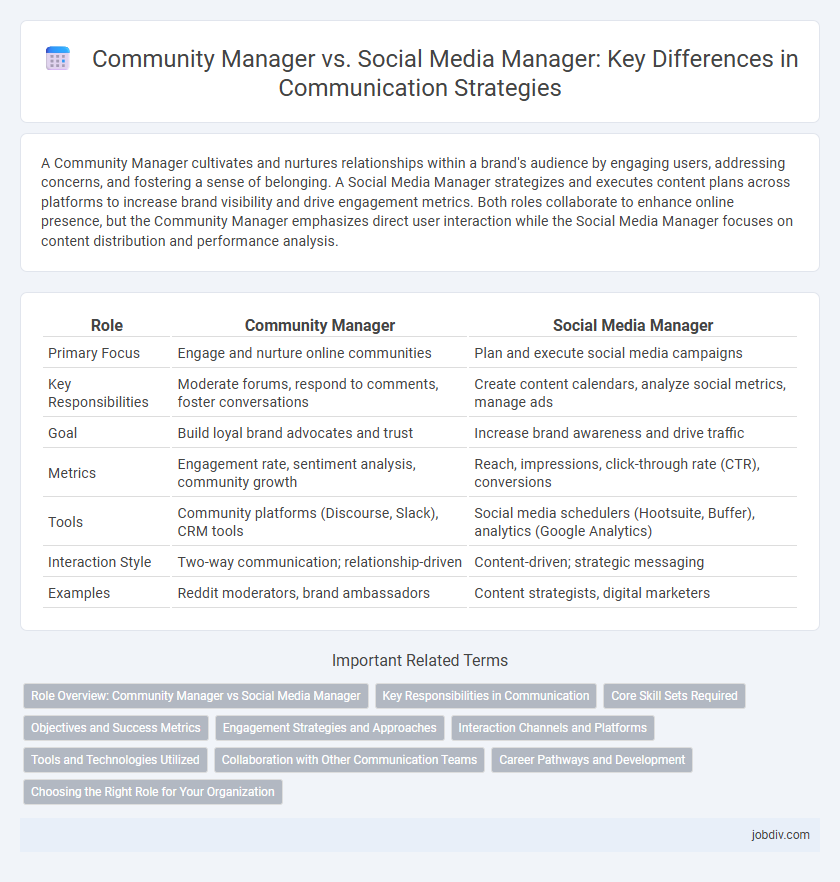A Community Manager cultivates and nurtures relationships within a brand's audience by engaging users, addressing concerns, and fostering a sense of belonging. A Social Media Manager strategizes and executes content plans across platforms to increase brand visibility and drive engagement metrics. Both roles collaborate to enhance online presence, but the Community Manager emphasizes direct user interaction while the Social Media Manager focuses on content distribution and performance analysis.
Table of Comparison
| Role | Community Manager | Social Media Manager |
|---|---|---|
| Primary Focus | Engage and nurture online communities | Plan and execute social media campaigns |
| Key Responsibilities | Moderate forums, respond to comments, foster conversations | Create content calendars, analyze social metrics, manage ads |
| Goal | Build loyal brand advocates and trust | Increase brand awareness and drive traffic |
| Metrics | Engagement rate, sentiment analysis, community growth | Reach, impressions, click-through rate (CTR), conversions |
| Tools | Community platforms (Discourse, Slack), CRM tools | Social media schedulers (Hootsuite, Buffer), analytics (Google Analytics) |
| Interaction Style | Two-way communication; relationship-driven | Content-driven; strategic messaging |
| Examples | Reddit moderators, brand ambassadors | Content strategists, digital marketers |
Role Overview: Community Manager vs Social Media Manager
A Community Manager fosters direct engagement with a brand's audience by building relationships and managing user interactions across forums and social platforms. A Social Media Manager develops and executes strategic content plans, focusing on brand awareness, campaign performance, and analytics across multiple social channels. Community Managers emphasize two-way communication and user advocacy, while Social Media Managers prioritize content creation, scheduling, and data-driven marketing outcomes.
Key Responsibilities in Communication
Community Managers focus on building and nurturing engaged online communities by facilitating conversations, responding to member queries, and fostering brand loyalty. Social Media Managers are responsible for creating, scheduling, and analyzing content on social media platforms to enhance brand visibility and drive audience growth. Both roles require strategic communication skills, but Community Managers prioritize direct interaction within communities, while Social Media Managers emphasize broader content dissemination and performance metrics.
Core Skill Sets Required
Community Managers excel in relationship-building, conflict resolution, and fostering genuine engagement through personalized communication and active listening. Social Media Managers focus on content creation, data analytics, and platform-specific marketing strategies to optimize reach and campaign performance. Mastery of social analytics tools, content scheduling, and crisis management differentiates the core skill sets between these two pivotal communication roles.
Objectives and Success Metrics
Community Managers prioritize building authentic relationships and fostering engagement within brand communities, measuring success through metrics like sentiment analysis, member retention, and community growth rates. Social Media Managers focus on brand visibility and content distribution across platforms, evaluating performance via reach, impressions, click-through rates, and conversion metrics. Understanding these distinct objectives and KPIs enables organizations to optimize communication strategies and allocate resources effectively.
Engagement Strategies and Approaches
Community Managers focus on fostering long-term relationships and nurturing a loyal audience through personalized interactions and active listening within owned platforms. Social Media Managers prioritize content creation, distribution, and paid promotions across multiple channels to maximize reach and brand visibility. Both roles employ engagement strategies, but Community Managers emphasize dialogue and community growth, while Social Media Managers leverage analytics and trends to boost engagement metrics.
Interaction Channels and Platforms
Community Managers primarily engage audiences through forums, online groups, and branded community platforms to foster deep, long-term relationships. Social Media Managers drive brand presence across public social networks like Facebook, Instagram, Twitter, and LinkedIn, focusing on content creation and campaign execution. Both roles utilize specific interaction channels, but Community Managers emphasize two-way dialogue within niche communities, while Social Media Managers optimize broad platform reach and real-time engagement.
Tools and Technologies Utilized
Community Managers primarily use platforms like Discord, Slack, and community forums to foster direct engagement and facilitate real-time conversations. Social Media Managers utilize tools such as Hootsuite, Buffer, and Sprout Social to schedule posts, monitor analytics, and manage multi-channel campaigns. Both roles increasingly leverage AI-powered analytics and CRM integrations to enhance audience insights and optimize communication strategies.
Collaboration with Other Communication Teams
Community Managers foster direct engagement by actively interacting with audience members and gathering real-time feedback, enhancing customer relationships. Social Media Managers strategically craft and schedule content to maximize brand reach and align with marketing objectives. Close collaboration between both roles ensures cohesive messaging across platforms, integrating audience insights with promotional campaigns for stronger communication impact.
Career Pathways and Development
Community Managers cultivate brand loyalty by engaging directly with audiences and managing online forums, while Social Media Managers strategize content and analyze platform performance to boost visibility. Career pathways for Community Managers often progress towards roles in customer experience or brand advocacy, whereas Social Media Managers can advance into digital marketing leadership or analytics specialization. Development opportunities for both include mastering data analytics, content strategy, and platform-specific tools to enhance audience engagement and campaign success.
Choosing the Right Role for Your Organization
Community Managers focus on building and nurturing relationships within online groups, fostering engagement and loyalty, whereas Social Media Managers strategize, create, and analyze content across platforms to boost brand visibility and reach. Organizations prioritizing direct interaction and community growth benefit from Community Managers, while those aiming to enhance digital marketing efforts and audience expansion should opt for Social Media Managers. Evaluating business goals, audience behavior, and communication needs is essential to select the appropriate role that drives meaningful impact.
Community Manager vs Social Media Manager Infographic

 jobdiv.com
jobdiv.com